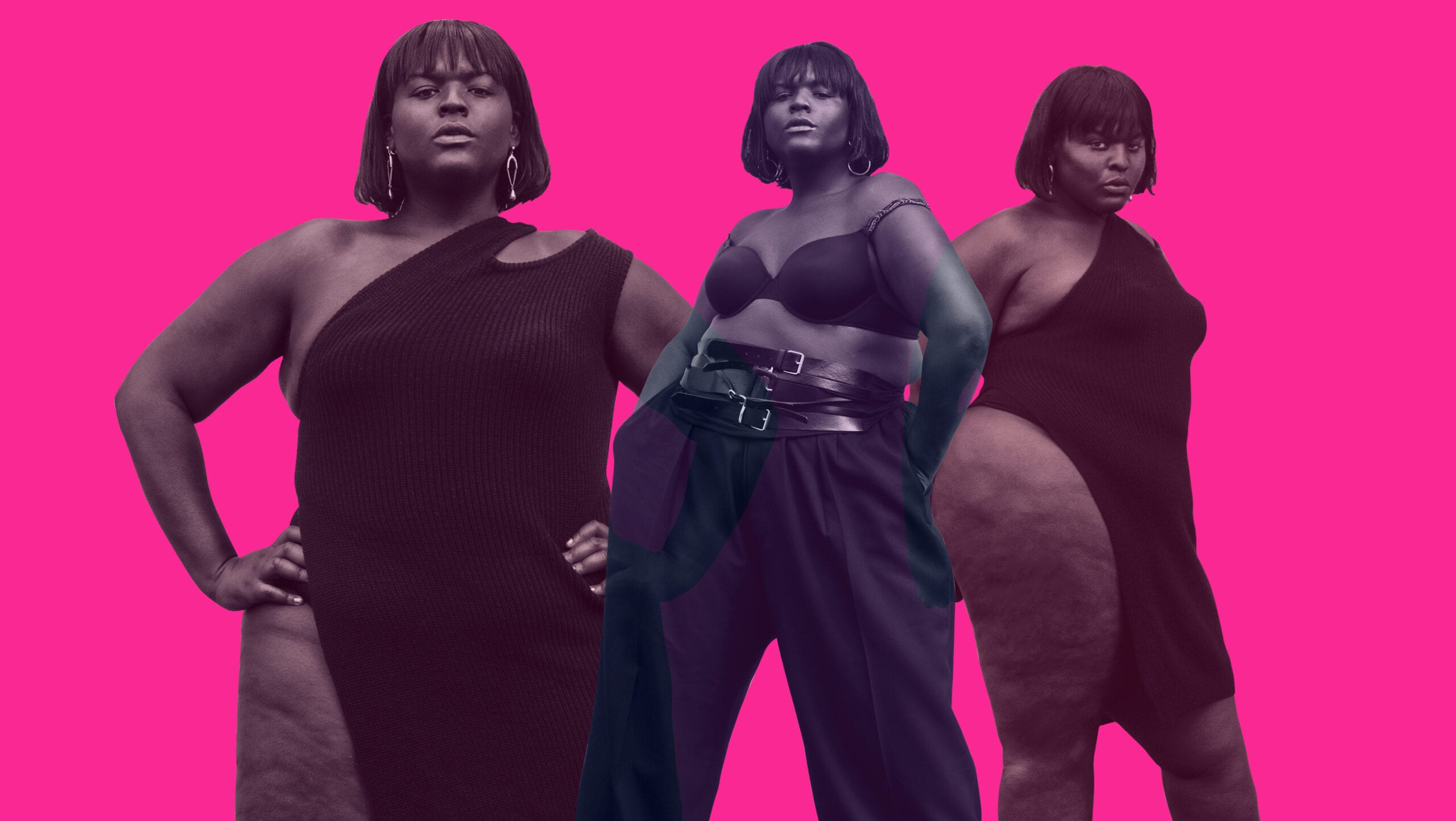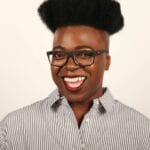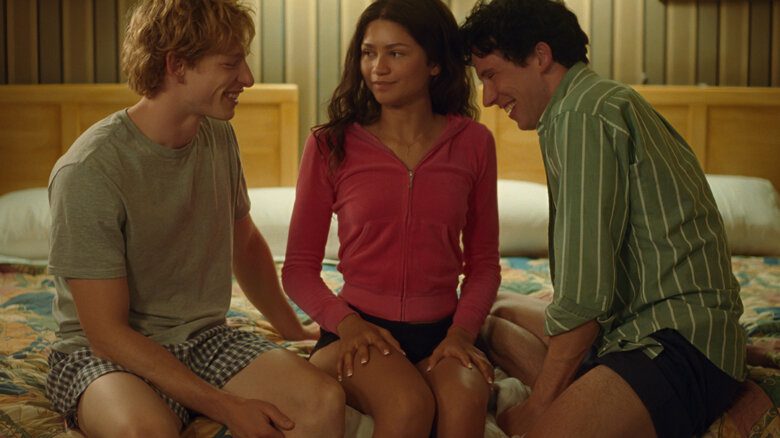While shows like Pose, Euphoria and Work in Progress reflect a moment of unprecedented trans, and broader LGBTQ2, representation in Hollywood, some members of the community, like Fatima Jamal, are rightfully skeptical. It’s not that she isn’t thankful or appreciative of the historic strides that have been and are continuing to be made. Rather, the model, artist and filmmaker questions visibility for visibility’s sake.
“It’s not enough. We deserve something else,” Jamal says. “I don’t always know what exactly that is, but I know that we need something else. Something that calls forth a reckoning. Nothing we have today is really giving me that.”
Jamal, also known by the moniker Fat Femme online, is a notable voice in conversations about Blackness and LGBTQ2 identity, fashion and art. An Atlanta native, she’s made a name for herself worldwide as a writer, performance artist and model, most recently making history walking in designer Stefano Pilati’s Fall 2020 Random Identities collection earlier this year in Florence. Black trans women aren’t usually used as models during men’s fashion weeks.
“I don’t think we give ourselves credit enough as marginalized people for how powerful we are,” she says. “Representation and visibility is given to us by larger power structures, but what do we give ourselves? I’m more interested in that. What questions are we asking ourselves to grow and heal? To challenge the ways this world constantly teaches us to hate ourselves? Settling for visibility and representation feels like asking for too little. I think we are due the world.”
No Fats, No Femmes, Jamal’s debut documentary, has been in the works for five years and counting. She recently launched a crowdfunding campaign to help with its completion. With No Fats, No Femmes, she’s hoping to put her graduate degree to use to examine how society’s dominant gaze impacts how we see ourselves and each other. The title is taken from the popular and problematic refrain often seen on gay dating apps, “No fats. No femmes. No Blacks. No Asians.”
“I centre and am fascinated by my own Black, fat body as a site of criticism,” Jamal writes on her campaign page. “[It is also] an invitation inward, toward self—often, a self undone, vulnerable and terrifying. I ruminate on what it means to sit with that self in a world that positions you away from it and what it would mean, in turn, to offer and present that self to the world with audacity.”
I spoke with Jamal about making No Fats, No Femmes, raising funds during the COVID-19 pandemic and beauty as a Black trans woman.
The last time I interviewed you, you were in the early stages of this film. That was almost four years ago. People never really know what goes into an independent production. Can you share what you’ve been up to since then?
That feels like forever ago. So much has changed. At the time of our first interview, I was in grad school at The New School in New York studying documentary. I’d only made what I called the documentary intro. I’ve been up to lots since then: I finished grad school and began a series of transitions, gender being most significant among them. The first round of fundraising helped me to accomplish my first production dates, filming in New York City and Richmond, Virginia. I’ve attended film workshop labs and retreats and even completed an artist fellowship with Queer|Art, working with mentor Stephen Winter to develop the project more. Present day, I’ve filmed in Atlanta, Florence, Italy and am planning more production dates to hopefully finish this project.
One of your original inspirations was the language we often see used on social dating apps, such as “No fats. No femmes. No Blacks. No Asians.” How has that inspiration changed over the years? What can audiences expect now?
Audiences can expect to leave very confronted and upset. Some parts might be entertaining, but I have a goal of making people feel uncomfortable. I’m not here to entertain. I still am thinking deeply about the language used on social media, but I’m more interested in what shapes that thinking and gaze. I’ve turned the camera more on myself and am using myself as a point of departure to consider how white supremacist, colonial gazes severely impact how we see ourselves and also how we see and understand others. I’ve found a way to tell that story because I’m not hiding behind words or the need to over-intellectualize my feelings and trauma.
“Any person that refuses to reimagine themselves is doomed to fail.”
One of the things that has stuck with me from that first interview has been about how people, and Black people specifically, fail gender. Do you still feel that way?
I still believe that white supremacist imaginings of anything does not serve Black people well. People are very afraid to give up convenience and consider it more fruitful than challenging what is and realizing the flaws within it. Any person that refuses to reimagine themselves is doomed to fail. And that’s why this world hates trans people so much because we dare, with audacity and courage, to reimagine ourselves. We understand that gender is what we give to it and not it to us. The more people realize how silly gender is, the more they will feel free to break away from scripts that their mother told them, that their mother told them. It’s all made up. And since that is the case, why not tell a different story?
Why is it important for you to not only be the main subject of No Fats, No Femmes, but also the director?
It is important to me because this project is deeply personal. It’s me making my voice known and heard to the world outside of myself. Also to tell my own story and to care for this narrative as it should be cared for. No one else can do that for me. This is me picking myself up.
You’re currently doing another round of crowdfunding to complete the documentary. Why this approach?
I’ve taken this approach because I have applied year-after-year for funding from big film organizations and have been denied. I don’t see many people considering it as a valuable story to be told and I’m actually grateful that they don’t see value in it because it proves my point. I know for sure that I’m better off trying more local approaches to achieve my goal. The first round of crowdfunding showed me that. It actually connected me to people all around the world who’d been waiting for a film like this. I would rather find more people like that to support it because it gives the project something that big film industry support cannot.
Tell me about the team helping you bring this film to life.
I am the luckiest girl in the world to work with the team I have. They are all very skilled artists and human beings in their own right. Each of them see me in a very real way and understand how critical relationship and collaboration is to my artistic practice. Their trust and faith in me is something that is taking this film places unimaginable. What’s most critical is that each of them have a very strong one-on-one relationship with me. The way they care for me and love me shows in the way that they capture and gaze at me. It has built such a wonderful foundation that it is bringing them together in a way that moves me. The energy this creates is one that I think the world should watch out for because each person is one that moves on a deeply spiritual level and is also asking, in their individual practice, very critical questions of this world and what we’ve been given. I wouldn’t have it any other way.
The promo video makes use of Lucille Clifton’s “Won’t You Celebrate with Me.” The first doc intro uses Mark Aghuar’s “A Litany for My Heavenly Brown Body.” In what ways are these two pieces connected to each other and to your perspective on why you’re making this film?
Both poems have a critical feminist subjectivity and call for celebration in them. I love that they are both declarative. They both represent how I feel about myself and they each offer a voice where I am silent and afraid to speak. Lucille Clifton is God. Mark Aguhar is God. Mark’s poem represents where I was with this project when I first began and Lucille’s poem represents where I am now. They are both so mighty!
You made history earlier this year as a Black trans woman walking in a menswear fashion show. I know your team was on hand to document this moment. How does it feel to be regarded in this way, as a model, as a standard of beauty?
It feels both strange and hard-won. Strange because the fashion industry is historically fat-phobic and anti-Black. My presence alone, or the presence of other fat people, will never change that. There is still this capitalist model of the sample size which, to me, creates a fear in people of being fat and also the notion that fat is something to work against in the fashion lifestyle and ecosystem. There was a moment in Florence when I looked around the room at the other models and I froze because the reality hit me: I was the only fat person in the room. It didn’t feel great and it made me emotional because it made me feel exceptional in a way that I severely dislike. It’s hard-won because every single person that I have worked with understands that I have such an incredible vision of myself and they want to contribute to it because they see how powerful it is.
How does being a model reflect or oppose your broader conceptions of beauty, desire and attraction?
Being a model has taught me to distrust beauty. As I’ve inched my way into fashion, beauty and entertainment industry spaces, I am made aware of how unimaginable and uncritical people’s gazes are. We don’t all see the same. That makes us different, yes—unique perhaps. But it is also the reason why I’m always disillusioned when I enter any space. Beauty, like many other things, is constructed and powered by money, status and race. It is also complicated by those things. I need beauty that does something besides making you want to be what you see. Beauty on the outside is so superficial. I guess that’s what makes people like it more and aspire to it.
Unfortunately, your campaign is happening during a pandemic. Any thoughts about the current moment and perhaps why people should still donate? I know this is a weird question, but I think there’s something to be said about how getting people to donate is a greater task at this moment.
I am terrified. I chose the fixed goal [on Indiegogo] this time around because I wanted to challenge myself to make all of it. It’s really hard to call it but I’m committed to seeing it all the way to the finish line. On the other hand, I don’t even feel comfortable asking for money. Like, it doesn’t even feel right asking people for money in such a critical time of need. I just want to be a balm, and to encourage and inspire people. I want to make my goal, but I am very realistic about the situation. I would be impressed if those with money to give step in to help me reach the goal, but I don’t want people who need money for survival giving it to me.


 Why you can trust Xtra
Why you can trust Xtra


